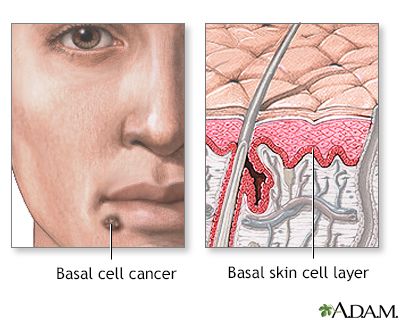Basal Cell Carcinoma

What is Basal Cell Carcinoma?
Basal cell carcinoma (BCC) is the most common type of skin cancer. It arises in the basal cells, which are found in the lower part of the epidermis, the outermost layer of the skin. BCCs often appear as a small, shiny bump or nodules.
Who’s at Risk for Basal Cell Carcinoma?
While anyone can develop BCC, certain factors increase the risk. These include prolonged exposure to sunlight or artificial ultraviolet (UV) light, having light-colored or freckled skin, a history of sunburns, older age, and a personal or family history of skin cancer.
What Causes Basal Cell Carcinoma?
BCC is primarily caused by long-term exposure to ultraviolet (UV) radiation from the sun and from tanning beds. UV radiation can damage the DNA in skin cells, causing abnormal growth and leading to cancer.
How does Basal Cell Carcinoma Start?
BCC typically begins as a small, shiny bump or nodule on the skin, often on sun-exposed areas such as the face, ears, and neck. Over time, it may become larger and more noticeable.
What are the Symptoms of Basal Cell Carcinoma? BCC often appears as a shiny, pearly nodule, or a flat, scaly, reddish patch. It may bleed easily and become crusty or ulcerated. Sometimes, it can resemble noncancerous skin conditions like psoriasis or eczema.
How is Basal Cell Carcinoma Diagnosed?
A dermatologist can often diagnose BCC by its appearance. To confirm the diagnosis, a biopsy is performed, which involves removing a small piece of the suspicious skin and examining it under a microscope.
How can Basal Cell Carcinoma be Treated?
Treatment options for BCC depend on the size, location, and depth of the tumor, as well as the patient's overall health. Options may include surgical removal, Mohs surgery (a technique that removes the cancer layer by layer), radiation therapy, cryosurgery (freezing the cancer cells), or topical creams.
What Complications May Occur with Basal Cell Carcinoma?
If left untreated, BCC can grow into surrounding tissues and bones, causing damage and disfigurement. While BCC rarely spreads to other parts of the body, it can recur in the same place, especially if the initial treatment wasn't extensive enough.
How Can I Prevent Basal Cell Carcinoma?
The best way to prevent BCC is to protect your skin from the sun. This can be achieved by seeking shade, wearing protective clothing, applying a broad-spectrum sunscreen with an SPF of 30 or higher, and avoiding tanning beds.
Long-term Management of Basal Cell Carcinoma
Long-term management of BCC involves regular skin checks to detect any new growths early and taking steps to protect the skin from further sun damage.
What is Recent Research Saying About Basal Cell Carcinoma?
Recent research on BCC is focused on improving treatment options, including the use of targeted therapies and immunotherapies. Other studies are investigating the genetic changes that contribute to the development of BCC.
Where Can I Go For More Information on Basal Cell Carcinoma?
For more information on BCC, visit reputable health websites like the American Academy of Dermatology, the American Cancer Society, or the Skin Cancer Foundation.

